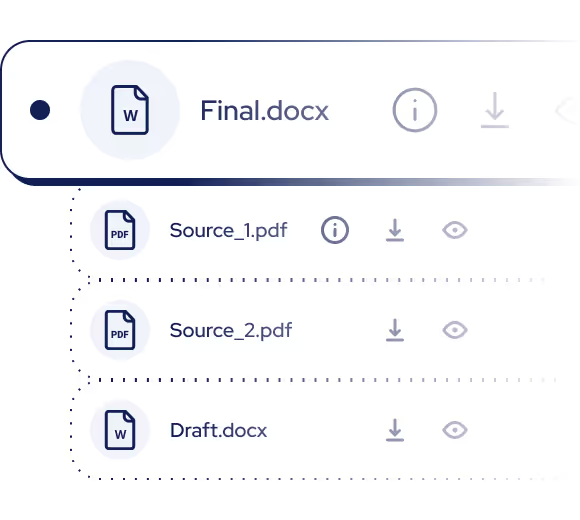Select your analytical essay writer









Benefits of our service
Refund Policy
We have a money-back guarantee for rare cases of miscommunication and other issues. Check our Refund Policy to learn more.
Fair, transparent pricing
Our analytical essay writing service is budget-friendly for all. We offer different discounts and one clear upfront price.
24/7 customer support
Our support team is here around the clock, day and night, to assist with any questions you might have.
No AI involved
The EssayHub team includes verified human writers who ensure high originality and personalization for every order. No AI, only high-quality essays.
100% Data safety
Your privacy is safeguarded by SSL and DMCA security protocols, bank-level encryption, and a strict Privacy Policy.
Direct communication with writer
Talk directly to your writer. Share your essay requirements, ask questions, and give feedback to make sure your vision is realized.
Affordable rates
Starting from $10.80 per page, our essay rates are fair and transparent. You can customize the final price depending on the deadline, page count, and paper complexity.
Place secure deposits via reliable payment methods: MasterCard, Visa, Maestro, American Express, JCB, Discover, and Diners Club International.
Customer feedback on EssayHub
This is the best essay service. Celina is a good writer who takes pride in her work.
Fantastic work! This man is really good at what he does. Spot on. Thanks again!
Wow. What an excellent writer to have I get my assignment two days before the due , excellent communication. Happy to have this write. Grade A+ I will definitely recommend you. Thanks a lots
He is very thorough in his writing
bought college admission essay from him, Jacob did an amazing job and delivered my work fast
My instruction wasn't clear, but he patiently revise the essay as I wanted. He is the best! Thank you so much.
Fast turnaround! Excellent communication and completed the task as requested.
Was very resourceful , worked with me for many weeks to perfect my .admission essay writing, and uploaded documents in a timely fashion
Amazing quality work, always efficient and on time
She is awesome!!! Hired her. She delivered few hour before the deadline and excellent work.
Amazing admission essay writing service, will definitely recommend to others!
Thank you so much for working fast and hard with great result THANK YOU
Followed instructions and did a great job. Very pleased with Meagan's work. Thank you!
Well worded and cited paper that fits with the assignment and subject.
She wrote my admission essay and all i gotta say is...10/10 ON EVERYTHING. SHE IS ON POINT
5 stars all the way! High quality paper, the instructions provided were very precise, and she delivered EXACTLY what was required - and well before the deadline also! Highly recommend.
Among all the college admission essay writers I've tried, this one is the best. Great professional Work. He did great helping me out
Very good work and was done way before set time 10/10
The writer sent excellent work and the finished product before the deadline! Would certainly recommend!
got admission essay help and it was great!! Very attentive to detail. Completed ahead of due date!!
He absolutely nailed the assignment. He had many details that was exactly what i was wanting to see in my paper.
Most Sufficient Person that I have had help with. He has work completed ahead of time and great insight to all subjects.
bought admission essay and now i realize how lucky i was to get him! Excellent work! I would definitely work with him again
Kelly worked with my tight timeline and delivered an excellent essay! I only had to add personal touches and the 5-page paper was ready to go.
Frequently asked questions
Is privacy guaranteed by your analytical essay writing service?
Absolutely, our service prioritizes your privacy. We keep your personal information and essay details confidential and secure, ensuring a worry-free experience.
What's the shortest deadline you can offer?
Our shortest deadline is 3 hours, giving you fast service. However, we suggest ordering ahead to leave room for revisions, ensuring your essay meets your expectations. Your satisfaction is priority for our book review writing services.
Will my essay be shown as an example to others?
No, your essay will not be shared with others as an example. We prioritize your privacy, and your work remains confidential by default. Your essay is for your use only.
Which analytical essay formats do you cover?
EssayHub team can master citations in all popular referencing styles, including APA, MLA, Chicago/Turabian, etc. Just share your instructions and let our pros work their magic.
Simplify your life with our analytical essay writing service
Working on an analytical essay can be tough. While the structure is similar to other written works, these essays have specific features:
- Deep research: Instead of informing or persuading the reader, an analytical paper digs deeper into the subject. Whatever you’re analyzing, you have to study the topic thoroughly.
- Critical thinking: You have to consider different perspectives and present clear evidence to support your arguments.
All this work can take hours or even days. You might spend sleepless nights gathering info, analyzing different viewpoints, and putting your essay together.
Sounds tedious? Or maybe you’re on a tight deadline? We’ve got a solution! Use article review writing services and enjoy effortless help
EssayHub service has a whole team of expert writers who are great at analyzing stuff. They can guide you through the toughest parts of writing. Getting our analytical essay help saves time and makes things less stressful.
Why you should use our analytical essay help
When you're looking for writing assistance, you want to be sure you're getting the best. Well, if you choose our quick essay writing service, we promise you'll be highly satisfied. Here are some key things you can expect from us:
- Professional writers: Before an expert joins our team, they must undergo a rigorous selection process, including interviews and tests. We only work with the most professional writers with excellent writing skills.
- Custom solutions: Your opinion matters at EssayHub. We provide a custom analytical essay writing service that closely follows your requirements and suggestions. Your expert will ensure your essay reads and feels authentically yours.
- Timely delivery: We're committed to meeting deadlines. No matter which paper you’re ordering, you can expect to receive your completed order on time.
- Originality: Every analytical essay writer crafts analytical papers from scratch. We have qualified authors who are skilled at creating original pieces. Your final paper will include all necessary references and undergo a thorough check and proofreading.
- Unlimited revisions: Share your feedback and request free edits for 14 to 30 days after essay completion.
Hundreds of students choose EssayHub daily, making us the best in the market! We start from scratch and can even match your writing style.
Skilled analytical essay writers at EssayHub
EssayHub connects customers with verified experts who know their stuff. Each analysis essay writer is a native English speaker with an academic degree and rich expertise. We thoroughly screen the candidates to ensure the best possible service. Only the most skilled writers successfully pass the vetting and join our team.
- ID & diploma verification: We ensure all applicants are real human experts with proven track records and Bachelor’s, Master’s, or Ph.D. degrees.
- Sample essay: Each reflection essay writer submits a copy of their work so we can evaluate their writing, research skills, and critical thinking. We want to make sure our helpers are as good as they claim to be.
- Testing: Our QA team conducts tests and interviews with writers to check their communication styles and attitudes towards work. This way, we ensure punctuality and reliability.
When you choose EssayHub, you can be confident your analytical essay is in safe hands.
Order easily and forget your troubles
Our analytical essay writing service prioritizes your comfort. The ordering process is simple and straightforward. It only takes three steps and no effort from you.
Here’s how you can get our analytical essay writing help:
- Set your requirements: Start by telling us about your essay. Select a due date, page count, and topic. Upload instructions and give a brief summary for your writer. The more information you share, the better results you’ll get.
- Choose a writer: Review bids from our elite writers and chat with candidates. Pick the most suitable expert to write essays for money based on experience, specialization, and customer feedback.
- Review and pay: You’ll receive a notification when your essay is completed. Carefully read the final draft and ensure it meets your initial requirements. Request amendments if necessary and release the payment to your pro.





